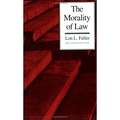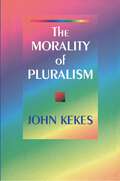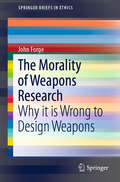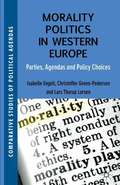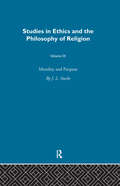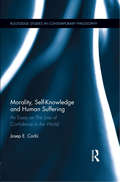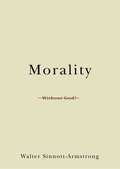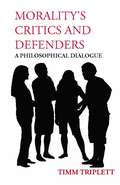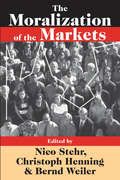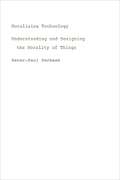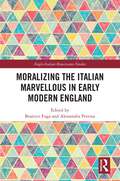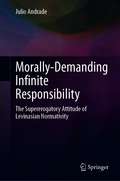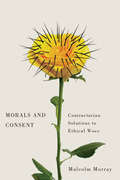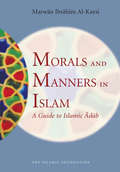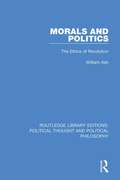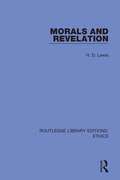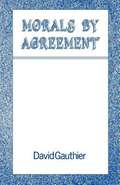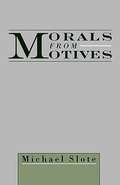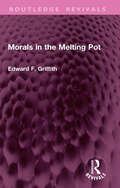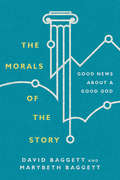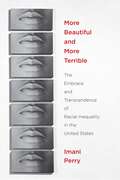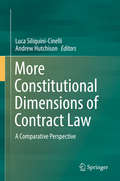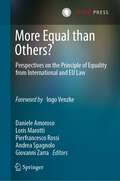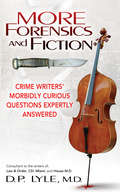- Table View
- List View
The Morality of Law Revised Edition
by Lon L. FullerIn this new edition, of The Morality of Law the first four chapters have been reprinted from the type as it was originally set, with only a minor correction or two. The only change of substance consists, therefore, in the addition of a fifth and final chapter entitled "A Reply to Critics."
The Morality of Pluralism
by John KekesControversies about abortion, the environment, pornography, AIDS, and similar issues naturally lead to the question of whether there are any values that can be ultimately justified, or whether values are simply conventional. John Kekes argues that the present moral and political uncertainties are due to a deep change in our society from a dogmatic to a pluralistic view of values. Dogmatism is committed to there being only one justifiable system of values. Pluralism recognizes many such systems, and yet it avoids a chaotic relativism according to which all values are in the end arbitrary. Maintaining that good lives must be reasonable, but denying that they must conform to one true pattern, Kekes develops and justifies a pluralistic account of good lives and values, and works out its political, moral, and personal implications.
The Morality of Weapons Research: Why it is Wrong to Design Weapons (SpringerBriefs in Ethics)
by John ForgeThis book addresses the morality of engaging in weapons research, a topic that has been neglected but which is extremely important. It is argued that this activity is both morally wrong and morally unjustifiable, and this implies that moral persons should not engage in it. The argument is not based on any pacifist assumptions: it is not assumed that neither individuals nor states should not defend themselves. What is wrong with weapons research is that it is the first step in the production of weapons, weapons are the means to harm, and harming without justification is always wrong. Those who study science, for instance those who are interested in the responsibilities of the scientist, are given a new perspective, while those who are practicing scientists will realize that they should not consider working to design new or improved weapons systems. This book is of interest to students and researchers working in ethics and technology, philosophy of technology, military ethics, and history of technology.
Morality Politics in Western Europe
by Isabelle Engeli Christoffer Green-Pedersen Lars Thorup LarsenWhy do some countries have 'Culture Wars' over morality issues such as abortion and same-sex marriage while other countries hardly experience any conflict? This book argues that morality issues only generate major conflicts in political systems with a significant conflict between religious and secular parties.
Morality & Purpose Vol 9
by J. L. StocksFirst published in 2003. Routledge is an imprint of Taylor & Francis, an informa company.
Morality, Self Knowledge and Human Suffering: An Essay on The Loss of Confidence in the World (Routledge Studies in Contemporary Philosophy)
by Josep CorbíIn this wholly original study, Josep Corbi asks how one should relate to a certain kind of human suffering, namely, the harm that people cause one another. Relying upon real life examples of human suffering--including torture, genocide, and warfare--as opposed to thought experiments, Corbi proposes a novel approach to self-knowledge that runs counter to standard Kantian approaches to morality.
Morality Without God?
by Walter Sinnott-ArmstrongSome argue that atheism must be false, since without God, no values are possible, and thus "everything is permitted." Walter Sinnott-Armstrong argues that God is not only not essential to morality, but that our moral behavior should be utterly independent of religion. He attacks several core ideas: that atheists are inherently immoral people; that any society will sink into chaos if it is becomes too secular; that without morality, we have no reason to be moral; that absolute moral standards require the existence of God; and that without religion, we simply couldn't know what is wrong and what is right. Sinnott-Armstrong brings to bear convincing examples and data, as well as a lucid, elegant, and easy to understand writing style. This book should fit well with the debates raging over issues like evolution and intelligent design, atheism, and religion and public life as an example of a pithy, tightly-constructed argument on an issue of great social importance.
Morality's Critics and Defenders: A Philosophical Dialogue
by Timm TriplettIn this engaging and accessible dialogue, four students offer contrasting arguments on the nature and scope of morality. While specific social policy issues, such as animal rights and racism, come into play, the discussions focus on more general--and fundamental--questions, including:Does morality limit personal freedom?Is morality relative to culture, or is it universal?What is the motivation to be moral?Is religion in tension with secular moral principles?Does science undermine morality?Can a common morality emerge out of the diversity of human interests? A glossary of important terms and suggestions for further reading are included.
The Moralization of the Markets
by Nico Stehr Christoph Henning Bernd WeilerNothing affects the modern economy (and society) more than decisions made in the market place, especially, but not only, decisions made by consumers. Although it is not startling to suggest that decisions made in production are affected by choices consumers make, consumers have long been viewed, not only by academic economists, as individual, isolated rational actors that make or refrain from purchases purely on the basis of narrow financial considerations. Markets are not and never were morally neutral. Market relations have always had an often taken-for-granted moral underpinning. The moralization of the markets refers to the dissolution and replacement of the conventional moral underpinnings of market conduct, for example, in the music market, financial markets, and corporate governance. It further implies not only the heightened importance of new ethical precepts, but the significant change in the role of moral ideals in market behavior. These profound transformations of economic conduct are accompanied and co-determined by societal conflicts. The moralization of markets represents thus a new stage in the social evolution of markets. The book is divided into four parts, in which the twelve chapters, written by contributors from different social science disciplines, deal with the context of the moralization of the markets; the major social institutions; and present case studies that examine European and American attitudes and behavior towards tobacco and GMO; expansion of the private and ethics in business; and how workers respond to the new corporate norms. This volume will be of interest to sociologists, economists, social scientists, and the general consumer alike.
Moralizing Technology: Understanding and Designing the Morality of Things
by Peter-Paul VerbeekTechnology permeates nearly every aspect of our daily lives. Cars enable us to travel long distances, mobile phones help us to communicate, and medical devices make it possible to detect and cure diseases. But these aids to existence are not simply neutral instruments: they give shape to what we do and how we experience the world. And because technology plays such an active role in shaping our daily actions and decisions, it is crucial, Peter-Paul Verbeek argues, that we consider the moral dimension of technology. Moralizing Technology offers exactly that: an in-depth study of the ethical dilemmas and moral issues surrounding the interaction of humans and technology. Drawing from Heidegger and Foucault, as well as from philosophers of technology such as Don Ihde and Bruno Latour, Peter-Paul Verbeek locates morality not just in the human users of technology but in the interaction between us and our machines. Verbeek cites concrete examples, including some from his own life, and compellingly argues for the morality of things. Rich and multifaceted, and sure to be controversial, Moralizing Technology will force us all to consider the virtue of new inventions and to rethink the rightness of the products we use every day.
Moralizing the Italian Marvellous in Early Modern England (Anglo-Italian Renaissance Studies)
by Beatrice Fuga Alessandra PetrinaThis volume breaks new ground in the exploration of Anglo-Italian cultural relations: it presents analyses of a wide range of early modern Italian texts adapted into contemporary English culture, often through intermediary French translations. When transposed into English, their Italian origin was frequently categorized as marvellous and consequently censured because of its strangeness: thus, English translators often gave their public a moralized and tamed version of Italy’s uniqueness. This volume’s contributors show that an effective way of moralizing Italian custom was to exoticize its origins, in order to protect the English public from an Italianate influence. This ubiquitous moralization is visible in the evolution of the concept of tragedy, and in the overtly educational aim acquired by the Italian novella, adapted for an allegedly female audience. Through the analysis of various literary genres (novella, epic poem, play, essay), the volume focuses on the mechanisms of appropriation and rejection of Italian culture through imported topoi and narremes.
Morally-Demanding Infinite Responsibility: The Supererogatory Attitude of Levinasian Normativity
by Julio AndradeThis book presents a conceptual mapping of supererogation in the analytic moral philosophical tradition. It first asks whether supererogation can be conceptualised in the absence of obligation or duty and then makes the case that it can be. It does so by enlisting the resources of the continental tradition, specifically using the work of Emmanuel Levinas and his notion of infinite responsibility. In so doing the book contributes to the ongoing efforts to create a common ethical terminology between the analytic and continental traditions within moral philosophy. Supererogatory actions are praiseworthy actions that go ‘beyond duty’, and yet are not blameworthy when not performed. In responding to this paradox, moral philosophy either brackets or attempts a reductionism of supererogation. Supererogation is epitomised in the paradigmatic figures of the saint and hero. Yet, most would agree that emulating these figures is too morally demanding. We rightly ask: where does moral obligation end? Is it even possible, or desirable to demarcate such a boundary? Besides the important theoretical issues these questions raise, they also speak to practical ethical dilemmas in the contemporary milieu, as they concern the global wealthy’s responsibility to the poor and the challenges of development aid work.
Morals and Consent: Contractarian Solutions to Ethical Woes
by Malcolm MurrayHow are we meant to behave? And how are we to defend whatever answer we give? Morals and Consent grounds our notion of morality in natural evolution, and from that basis, Malcolm Murray shows why contractarianism is a far more viable moral theory than is widely believed. The scope of Morals and Consent has two main parts: theory and application. In his discussion of theory, Murray defends contractarianism by appealing to evolutionary game theory and metaethical analyses. His main argument is that we are not going to find morality as an objective fact in the world, and that instead, we can understand morality as a reciprocal cooperative trait. From this minimal moral architecture, Murray derives his innovative consent principle. The application of the theory, detailing what contractarians can – or ought to – say about moral matters, takes up the greater portion of the work. Murray offers a trenchant examination of what moral constraints we can claim concerning death (abortion, euthanasia, and capital punishment), sex (pornography, prostitution, and sexual assault), beneficence (toward present and future people, animals, and the environment), and liberty (genetic enhancement, organ sales, and torture). By focusing on evolutionary contractarianism and the epistemic justification of our moral claims – or lack thereof – Malcolm Murray’s Morals and Consent is a serious advance in the field of applied ethics and fills an important void.
Morals and Manners in Islam
by Marwan Ibrahim Al-KaysiMorals and Manners in Islam is a brief yet comprehensive handbook for Muslims and those non-Muslims interested in acquiring a broad knowledge of the Muslim way of life. The book's contents, derived mainly from the Qur'an and the Sunnah, the main sources of jurisprudence, are listed in points format.
Morals and Markets
by Daniel Friedman Daniel McneillIn this book, economist and evolutionary game theorist Daniel Freidman demonstrates that our moral codes and our market systems, while often in conflict, are really devices evolved to achieve similar ends, and that society functions best when morals and markets are in balance with each other.
Morals and Politics: The Ethics of Revolution (Routledge Library Editions: Political Thought and Political Philosophy #2)
by William AshFirst published in 1977. Ethics is the most practical branch of philosophy: its immediate concern is with people's actions. Yet most philosophers do little to relate ethics intelligibly to the human situation. In this inquiry into the nature of ethics, William Ash draws on the relevant works of Marx, Engels, Lenin and Stalin to present the theory and practice of Marxist ethics. He offers an explanation of the moral aspect of Marx's dictum: 'The philosophers have only interpreted the world, in various ways; the point, however, is to change it.‘ The book includes, perhaps for the first time in so considered a form, an assessment of Mao Tsetung's contribution to Marxist moral philosophy, together with the ethical implications of such developments in social practice as the Proletarian Cultural Revolution. The author deals with the question of value by analysing the concept of 'good'; with the question of claims on people and things by analysing the concept of 'right'; with the question of the limits and scope of freedom of choice and action by analysing the concept of 'ought'.’ Clearly written in order to 'de-mystify' the subject, the book challenges readers to test the author's enlightened, Marxist approach in terms of the ethical ordering of their own society.
Morals and Revelation
by H. D. LewisOriginally published in 1951, this book discusses morality and religion , with special attention being paid to the theologian Emil Brunner. It critically examines the state of ethical thinking in the first half of the twentieth century and examines the question of freedom and guilt particularly in relation to psychological theories. The issue of collective guilt is also subjected to close analysis. The problem of our knowledge of God is also discussed with the focus on mysticism and revelation.
Morals by Agreement
by David Gauthier'The high point of its author's achievement, and a major work in contemporary moral and political philosophy.' --The Times Higher Education Supplement
Morals from Motives
by Michael SloteMorals from Motives develops a virtue ethics inspired more by Hume and Hutcheson's moral sentimentalism than by recently-influential Aristotelianism. It argues that a reconfigured and expanded "morality of caring" can offer a general account of right and wrong action as well as social justice. Expanding the frontiers of ethics, it goes on to show how a motive-based "pure" virtue theory can also help us to understand the nature of human well-being and practical reason.
Morals in the Melting Pot (Routledge Revivals)
by Edward F. GriffithFirst published in 1948, Morals in the Melting Pot is an important historical reference work addressing some of the age-old moral dilemmas in society. Edward Griffith discusses themes like contraception, sex and religion, divorce, homosexuality, abortion, adolescent problems, preparation for marriage, and extramarital relationships. The author argues for having the capacity to appreciate moral truth and give integrity and purpose to actions which can otherwise become isolated and devoid of meaning and he says that this requires a degree of spiritual awareness which many people seem to ignore or don't even possess. This book will be of interest to scholars and researchers of sociology, ethics and moral philosophy.
The Morals of the Story: Good News About a Good God
by David Baggett Marybeth BaggettChristianity Today
More Beautiful and More Terrible: The Embrace and Transcendence of Racial Inequality in the United States
by Imani PerryPerry argues that racism in America has moved into a new phase--post-intentionalFor a nation that often optimistically claims to be post-racial, we are still mired in the practices of racial inequality that plays out in law, policy, and in our local communities. One of two explanations is often given for this persistent phenomenon: On the one hand, we might be hypocritical—saying one thing, and doing or believing another; on the other, it might have little to do with us individually but rather be inherent to the structure of American society.More Beautiful and More Terrible compels us to think beyond this insufficient dichotomy in order to see how racial inequality is perpetuated. Imani Perry asserts that the U.S. is in a new and distinct phase of racism that is “post-intentional”: neither based on the intentional discrimination of the past, nor drawing upon biological concepts of race. Drawing upon the insights and tools of critical race theory, social policy, law, sociology and cultural studies, she demonstrates how post-intentional racism works and maintains that it cannot be addressed solely through the kinds of structural solutions of the Left or the values arguments of the Right. Rather, the author identifies a place in the middle—a space of “righteous hope”—and articulates a notion of ethics and human agency that will allow us to expand and amplify that hope.To paraphrase James Baldwin, when talking about race, it is both more terrible than most think, but also more beautiful than most can imagine, with limitless and open-ended possibility. Perry leads readers down the path of imagining the possible and points to the way forward.
More Constitutional Dimensions of Contract Law: A Comparative Perspective
by Luca Siliquini-Cinelli Andrew HutchisonThis second volume on the constitutional dimension of contract law explores this increasingly relevant subject in jurisdictions that are usually overlooked by mainstream scholarship in the English-speaking world. With chapters on Finland and other Nordic Countries from a comparative perspective, Spain, Japan, Somalia, Nigeria, Brazil, and Peru, the contributions presented here offer much-needed, context-informed insights on whether – and if so, why, how and to what extent – the development of contract law is being influenced by constitutional values and fundamental rights issues (or vice-versa). The book represents a valuable addition to comparative law literature on the interplay between public (i.e., constitutional) and private (i.e., contract) law by revealing the inner dynamics through which these two branches interact and (at times) inform each other, whilst also enhancing our understanding of the law’s nature, function, and transformative potential at the macro, meso, and micro levels.
More Equal than Others?: Perspectives on the Principle of Equality from International and EU Law
by Giovanni Zarra Pierfrancesco Rossi Daniele Amoroso Loris Marotti Andrea SpagnoloThis book analyses the principle of equality from three perspectives: public international law, private international law and EU law. It is the first book in English providing a comprehensive overview of this principle in these areas of law and showing the current trends and issues concerning its application. Its main goal is to understand whether and to what extent the principle of equality has been affirmed in public and private international law, as well as EU law, and what – if any – the common core of this principle is.The analysis carried out in this contributed volume starts from general analyses of the principle of equality in the areas of the law covered by the book and then discusses the principle in more specific areas, such as human rights law, international adjudication (including investment law) and the law of international organizations. The book is intended to become a benchmark for academics dealing with matters of equality in public international law, private international law and EU law. It will be a useful tool for practitioners too, the collected chapters being based on the relevant case law dealing with the principle of equality. Daniele Amoroso is Professor of International Law in the Department of Law of the University of Cagliari, Cagliari, Italy. Loris Marotti is Assistant Professor of International Law in the Department of Law at the Federico II University of Naples, Italy. Pierfrancesco Rossi is Postdoctoral Fellow in International Law in the Department of Law of Luiss University, Rome, Italy. Andrea Spagnolo is Professor of International Law in the Department of Law of the University of Turin, Turin, Italy. Giovanni Zarra is Professor of International Law and International Litigation in the Department of Law at the Federico II University of Naples, Italy.
More Forensics and Fiction
by D P LyleThis compilation of medical and forensic science questions from crime writers around the world provides insight into medical and forensic science as well as a glimpse into the writer's creative mind. How do hallucinogenic drugs affect a blind person? Will snake venom injected into fruit cause death? How would you perform CPR in a helicopter? What happens when someone swallows razor blades? How long does it take blood to dry? Can DNA be obtained from a half-eaten bagel? D. P. Lyle, MD, answers these and many more intriguing questions. The book is a useful and entertaining resource for writers and screenwriters, helping them find the information they need to frame a situation and write a convincing description. TV viewers, readers who enjoy crime fiction, and those who want to know more about forensic science can keep up with the news and understand the science behind criminal investigation. From traumatic injuries to the coroner's office, the questions and answers are divided into five parts, making it a compendium of the incredible information that lies within the world of medicine and forensics.
